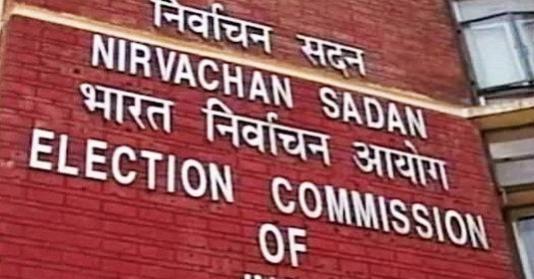Representatives of the National Conference and Peoples' Democratic Party raised the issue of inordinate delay in conducting the maiden assembly elections in the Union Territory of Jammu and Kashmir during the all-party meeting convened by the Election Commission of India in New Delhi on Monday.
Although the meeting was convened only to demonstrate the functioning of the multi-constituency prototype Remote Voting Machine, regional parties seized the opportunity and questioned the delay in conducting the assembly polls in Jammu and Kashmir.
Quoting PDP chief spokesman Suhail Bukhari, a Kashmir-based news agency reported that he raised the issue of delay in holding assembly elections in Jammu & Kashmir during the meeting.
Bukhari, who represents PDP in the all-party meeting, claimed that he vociferously raised the issue of denying democratic rights to the people of J&K to elect their government.

He said the Chief Election Commissioner told the meeting that all technical processes have been completed in Jammu & Kashmir.
"The CEC told us that exercises of delimitation and revision of voters have been completed," he said, adding that CEC further said they are also concerned over the matter.
JKNC Treasurer @oberoi_shammi attended the meeting convened by ECI to demonstrate the Remote Electronic Voting machines to facilitate voting among 20 crore domestic migrants working across the country. He also raised concern over the uncertainty over assembly elections. pic.twitter.com/oxNbrrDPiC
— JKNC (@JKNC_) January 16, 2023
In a statement, the National Conference said that its treasurer Shammi Oberoi while speaking on the issue that when the government is concerned about facilitating domestic migrants to exercise their voting rights, the 1.4 crore people of Jammu and Kashmir continue to remain deprived of exercising their democratic rights.
Oberoi further added that J&K which hasn't seen elections for the last so many years is suffering on many fronts. He raised the concern that the people of J&K are being kept away from exercising their democratic rights and choosing their own government which would have effectively addressed their day-to-day issues.
In its response, the Chief Election Commissioner acknowledged the points raised by Oberoi and said that the ECI is also concerned about the assembly elections in J&K.
The CEC said that preparations for the polls are underway and that much groundwork has been covered in terms of delimitation of constituencies, electoral rolls revision, and booth identification, the National Conference said.
Assembly Elections were last held in J&K in November-December 2014 and the Peoples' Democratic Party (PDP)-Bharatiya Janata Party (BJP) coalition government formed government in March 2015. The BJP walked out of the coalition in 2018 and the government was dissolved.
- Jammu and Kashmir is without an elected government since June 2018 when BJP dumped the Peoples Democratic Party (PDP) followed by the resignation of the then Chief Minister Mehbooba Mufti.
- Five months later, on November 28, 2018, then Jammu and Kashmir Governor Satya Pal Malik dissolved the legislative assembly minutes after Mehbooba Mufti-led PDP staked a claim to form the government with the support of Congress and the National Conference.
- A month later on December 19, 2018, then President Ram Nath Kovind issued a proclamation promulgating President's Rule in J&K under article 356 of the Constitution of India.
- Eight months later on August 5, 2019, the BJP government abrogated Article 370 and bifurcated Jammu and Kashmir into two Union Territories, Jammu and Kashmir, and Ladakh.
ECI showcases RVM to political parties
As reported earlier, today's meeting was convened only to demonstrate the functioning of the multi-constituency prototype Remote Voting Machine.
The ECI has developed a remote electronic voter machine (RVM) with migrant voters in mind. On Monday, the ECI will demonstrate the working of the RVM to political parties from all over the country at the upcoming meeting.

The Election Commission of India (ECI) on Monday showcased the remote electronic voting machine prototype for migrant voters to representatives of political parties.
The Election Commission had called the chairpersons, presidents, and general secretaries of all the national parties for a meeting today.
The ECI invited all recognised eight national and 57 regional political parties to demonstrate the functioning of the multi-constituency prototype remote EVM.
The Commission has also circulated a concept note amongst the political parties highlighting the challenges of defining domestic migrants, implementation of Model Code of Conduct, ensuring secrecy of voting, facility of polling agents for identification of voters, process and method of remote voting, and counting of votes, among other issues.
The Commission also solicited written views of recognized political parties by January 31, 2023, on various related issues including changes required in legislation, changes in administrative procedures, and voting method/RVM/technology, if any other, for the domestic migrants.

















